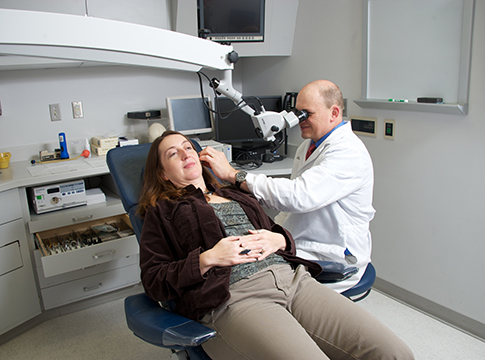Why an ENT Might Be the Best Option for Your Allergy Management?
Why an ENT Might Be the Best Option for Your Allergy Management?
Blog Article
Checking out the Field of Otolaryngology: What to Anticipate When You Get In Touch With an ENT
Otolaryngology, commonly described as ENT, encompasses the diagnosis and therapy of throat, nose, and ear conditions. For those experiencing associated issues, getting in touch with an ENT professional can supply quality and relief. Comprehending what to anticipate during such consultations is important for effective interaction and care. This overview will outline crucial aspects of the ENT experience, including common reasons for check outs and the processes associated with medical diagnosis and therapy.

Recognizing Otolaryngology: An Introduction
Otolaryngology, frequently described as ENT (Ear, throat, and nose) medicine, is a customized branch of medicine that concentrates on the medical diagnosis and therapy of conditions affecting these crucial areas of the human body. This field includes a large range of conditions, including those pertaining to hearing, balance, breathing function, and speech. Otolaryngologists are educated to take care of both medical and clinical treatments, making use of innovative strategies and technologies. Their expertise extends beyond standard conditions, dealing with problems such as allergies, sinus infections, and hearing loss. In addition, they play an important role in the management of head and neck cancers, supplying complete care tailored to private patient needs. In general, otolaryngology remains necessary for keeping health and wellness and lifestyle in affected individuals.
Typical Factors to See an ENT Professional
Many people seek the know-how of an ENT specialist for a variety of factors, reflecting the diverse nature of problems that impact the ear, throat, and nose. Common problems include chronic sinusitis, which commonly causes consistent nasal blockage and facial pain. Allergies and their connected signs, such as sneezing and itching, also prompt brows through to these specialists (ENT). Hearing loss, whether gradual or abrupt, is another substantial factor for examination. Furthermore, people might look for analysis for throat problems, consisting of persistent hoarseness or ingesting difficulties. Rest apnea, characterized by interrupted breathing during sleep, is often attended to by ENT professionals. Each of these conditions highlights the significance of specialized treatment in handling complex ENT-related wellness concerns
Planning for Your ENT Appointment
When getting ready for an ENT appointment, it is vital to collect relevant details and consider any type of details concerns. Patients ought to put together a detailed medical history, consisting of previous ear, nose, or throat issues, surgical treatments, and existing drugs. Recording symptoms-- such as intensity, regularity, and duration-- can offer important understandings for the ENT expert. Additionally, individuals need to prepare a listing of questions they desire to ask, making sure that all issues are resolved throughout the check out. Bringing along any kind of relevant medical records or test outcomes can further aid the ENT in comprehending the client's problem. Ultimately, patients ought to verify their visit details, including date, place, and time, to decrease any final complication. Proper preparation can improve the performance of the appointment and lead to much better end results.
What to Expect During the Appointment
As the assessment begins, the individual can expect to participate in a detailed discussion with the ENT professional regarding their signs and case history. The expert will certainly ask about the duration, regularity, and extent of signs such as hearing loss, nasal blockage, or sore throat. Furthermore, the individual's previous medical conditions, drugs, and any appropriate family history will be reviewed, helping the expert in forming a complete understanding of the client's health. The ENT might additionally ask about lifestyle variables, such as direct exposure to allergens or toxic irritants. This open dialogue develops a structure for the examination, ensuring that the client's worries are addressed and establishing the stage for any kind of necessary analyses or recommendations for therapy.
Diagnostic Tests and Procedures in Otolaryngology
An array of analysis tests and treatments are crucial in otolaryngology to precisely examine and diagnose problems influencing the nose, ear, and throat. Common tests include audiometry, which measures hearing function, and tympanometry, examining center ear stress. Nasal endoscopy permits visualization of the nasal flows and sinuses, while laryngoscopy analyzes the throat and vocal cables. Imaging techniques, such as CT scans and MRIs, give thorough views of head and neck structures. Allergy screening might additionally be carried out to recognize triggers for sinus or respiratory concerns. These diagnostic tools enable ENT specialists to develop a thorough understanding of people' problems, ensuring customized and efficient monitoring strategies. Correct diagnosis is necessary for successful therapy end results in otolaryngology.
Therapy Alternatives Supplied by ENT Specialists
ENT read more specialists provide a variety of treatment alternatives customized to address details conditions influencing the nose, ear, and throat. These treatments range from conservative strategies, such as medicine and lifestyle alterations, to more invasive treatments. For example, allergic reactions might be managed with antihistamines or immunotherapy, while chronic sinus problems may require nasal corticosteroids or sinus surgical treatment. For hearing loss, ENT experts frequently recommend hearing help or surgical interventions like cochlear implants. In situations of throat disorders, options can consist of speech treatment or procedures to remove blockages. In addition, they might offer assistance for handling sleep apnea, including making use of CPAP tools or medical interventions. On the whole, the goal is to enhance patients' high quality of life through personalized treatment and reliable treatment techniques.
When to Look For Follow-Up Treatment With an ENT
When to look for follow-up care with an ENT specialist is crucial for managing continuous symptoms or difficulties associated to nose, throat, and ear problems, identifying. Patients should think about arranging a follow-up appointment if symptoms continue regardless of preliminary treatment, such as persistent ear discomfort, nasal congestion, or throat discomfort. Modifications in hearing, equilibrium concerns, or uncommon nasal discharge may also necessitate more evaluation. In addition, if a person experiences side effects from suggested medicines or has actually undertaken a medical procedure, follow-up treatment is necessary to keep track of healing and address any problems. Timely assessments can assure reliable management of conditions, stop possible difficulties, and give comfort concerning one's wellness. Seeking follow-up care advertises proactive health and wellness management in otolaryngology.
Often Asked Concerns

What Qualifications Should I Try to find in an ENT Expert?
When looking for an ENT specialist, one must look for board certification, pertinent experience, and solid individual reviews. Additionally, reliable interaction skills and a compassionate strategy can greatly boost the total therapy experience.
How Do I Select the Right ENT for My Demands?
Choosing the appropriate ENT professional entails evaluating their credentials, experience, and person reviews (ENT Clinic). It is crucial to consider their interaction design and strategy to therapy, guaranteeing they line up with the person's details health needs and choices
Exist Any Risks Related To ENT Procedures?
The threats associated with ENT treatments might consist of infection, bleeding, anesthetic complications, and prospective damages to bordering frameworks. Patients ought to review these dangers with their medical professional to understand private worries and warranty notified choices.
How Can I Manage Anxiety Before My ENT Visit?
To take care of anxiousness prior to an appointment, individuals can exercise deep breathing exercises, picture positive outcomes, prepare concerns beforehand, and look for assistance from good friends or household, fostering a sense of confidence and peace.
What Should I Do if I Experience Side Impacts From Therapy?
The person should quickly report them to their healthcare copyright if side results from treatment take place. Adjustments to treatment or additional interventions may be required to ensure security and effectiveness in managing their condition - Otorrinolaringologia. As the examination begins, the individual can expect to engage in a complete conversation with the ENT professional concerning their symptoms and medical history. These diagnostic devices make it possible for ENT professionals to establish a complete understanding of people' problems, making certain customized and reliable monitoring plans. ENT professionals provide a variety of treatment options tailored to deal with details problems influencing the nose, ear, and throat. When looking for an ENT specialist, one ought to look for board qualification, appropriate experience, and strong patient evaluations. Choosing the ideal ENT expert involves examining their qualifications, experience, and client testimonials
Report this page